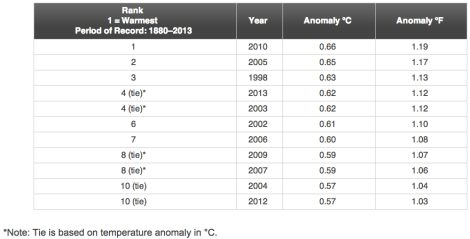Our extreme-weather-wearied planet fell short in 2013 of breaking the record for hottest year in modern civilization, but it came close. Last year was either the fourth hottest since record-keeping began, or the seventh, depending on which U.S. agency’s data you most trust.
At the surface of the seas and everywhere else around the world, last year was an average of 1.12 degrees F warmer than the 20th century average, NOAA concluded. That made 2013 the 37th year in a row with above-average global temperatures, according to NOAA’s calculations.
NASA performed its own analysis, concluding that 2013 tied 2006 and 2009 as the seventh warmest year since 1880.
Weather.com explains that the discrepancy between the two agencies’ findings is no big deal:
Despite the gap between the two rankings — due to NASA’s “processing [temperature data] slightly differently than NOAA” in areas like the Arctic and Antarctica, NASA climatologist Gavin Schmidt said in a conference call — there’s actually little difference between them.
NASA and NOAA certainly agree that nearly all of the hottest years on record have occurred since the dawn of the new millennium. Notice that only one of the 10 warmest years does not start with the digits “2” and “0,” according to NOAA:

NOAAClick to embiggen.
With such a clear warming trend, it’s little wonder that climate skeptics are shifting from straight-out denialism to claiming that climate change is no big deal.
“If serious warming happens, we can adjust,” writes John Stossel in a typically unscientific column in the conservative Washington Examiner. “It will be easier to adjust if America is not broke after wasting our resources on trendy gimmicks like windmills.”



